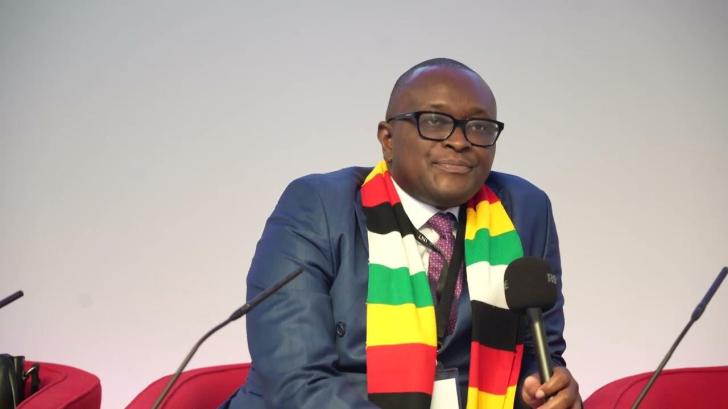News / National
Zimbabwe to train over 10,000 teachers annually in AI
28 May 2025 at 11:07hrs | Views

More than 10,000 teachers and lecturers in Zimbabwe will receive annual training in artificial intelligence (AI) and digital literacy under a new partnership between the Zimbabwean Government and the United Arab Emirates (UAE). This initiative forms part of a broader collaboration focusing on solar energy, digital education, and skills development aimed at accelerating Zimbabwe's industrialisation and modernisation agenda.
Information, Publicity and Broadcasting Services Minister Dr Jenfan Muswere announced the developments during a post-Cabinet media briefing in Harare yesterday. He said Cabinet received and noted a report on the recently concluded Innovation Africa Summit of Ministers of Education, Information Communication and Technology, and Skills, held last month in Addis Ababa, Ethiopia.
The summit, which was established in 2012, brings together governments, private sector leaders, and development partners to align strategies for transformative education and training systems across Africa. This year's theme, "Educate an African Fit for the 21st Century," aligns with the African Union's 2024 mandate to build resilient, inclusive, and digitally enabled education systems.
"As a way forward, the Government of Zimbabwe will partner with the Digital Schools and Global Skilling Academies of the United Arab Emirates to harness the potential of solar energy, digital education, skills development, and public-private community partnerships to drive inclusive growth in Zimbabwe's rural communities," Dr Muswere said.
He added that Zimbabwe will strengthen Competence-Based Education and Training reforms to better equip learners with practical skills relevant to today's economy.
A key highlight of the partnership is the commitment to train over 10,000 teachers and lecturers annually in AI and digital literacy to enhance education quality and relevance. To promote inclusivity, the government plans to leverage the One Laptop per Child initiative's subsidised model to provide affordable digital learning tools, bridging the digital divide between urban and rural learners.
"More importantly, the Government will make deliberate efforts to promote STEM education - Science, Technology, Engineering, and Mathematics - especially for women and girls, ensuring equal access to opportunities and empowering them to take leadership roles in these critical sectors," Dr Muswere emphasized.
The partnership also includes plans to establish more ICT manufacturing hubs under the SADC Industrialisation initiative, alongside integrating hydrogen energy and solar-powered technologies into the innovation pillars of Zimbabwe's National Development Strategy 2 (NDS2). These efforts aim to drive industrial growth, promote sustainable energy solutions, and foster innovation in key economic sectors.
The Innovation Africa Summit seeks to close education gaps on the continent through public-private partnerships, focusing on digital transformation, teacher development, equitable access, and alignment with the African Union Agenda 2063, Sustainable Development Goal Four (SDG 4), and the Continental Education Strategy for Africa (2016–2025).
This strategic collaboration between Zimbabwe and the UAE signals a major step toward a digitally empowered and industrially vibrant future for the country.
Information, Publicity and Broadcasting Services Minister Dr Jenfan Muswere announced the developments during a post-Cabinet media briefing in Harare yesterday. He said Cabinet received and noted a report on the recently concluded Innovation Africa Summit of Ministers of Education, Information Communication and Technology, and Skills, held last month in Addis Ababa, Ethiopia.
The summit, which was established in 2012, brings together governments, private sector leaders, and development partners to align strategies for transformative education and training systems across Africa. This year's theme, "Educate an African Fit for the 21st Century," aligns with the African Union's 2024 mandate to build resilient, inclusive, and digitally enabled education systems.
"As a way forward, the Government of Zimbabwe will partner with the Digital Schools and Global Skilling Academies of the United Arab Emirates to harness the potential of solar energy, digital education, skills development, and public-private community partnerships to drive inclusive growth in Zimbabwe's rural communities," Dr Muswere said.
He added that Zimbabwe will strengthen Competence-Based Education and Training reforms to better equip learners with practical skills relevant to today's economy.
"More importantly, the Government will make deliberate efforts to promote STEM education - Science, Technology, Engineering, and Mathematics - especially for women and girls, ensuring equal access to opportunities and empowering them to take leadership roles in these critical sectors," Dr Muswere emphasized.
The partnership also includes plans to establish more ICT manufacturing hubs under the SADC Industrialisation initiative, alongside integrating hydrogen energy and solar-powered technologies into the innovation pillars of Zimbabwe's National Development Strategy 2 (NDS2). These efforts aim to drive industrial growth, promote sustainable energy solutions, and foster innovation in key economic sectors.
The Innovation Africa Summit seeks to close education gaps on the continent through public-private partnerships, focusing on digital transformation, teacher development, equitable access, and alignment with the African Union Agenda 2063, Sustainable Development Goal Four (SDG 4), and the Continental Education Strategy for Africa (2016–2025).
This strategic collaboration between Zimbabwe and the UAE signals a major step toward a digitally empowered and industrially vibrant future for the country.
Source - online

















